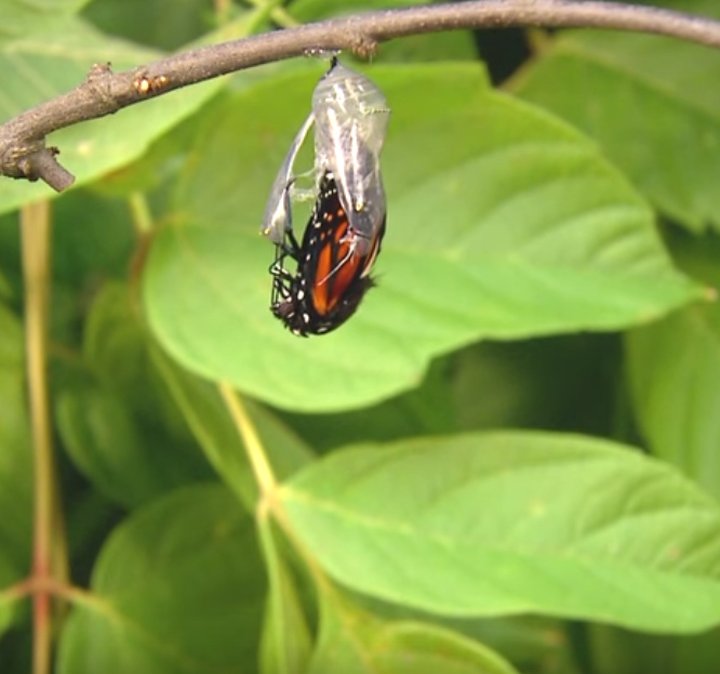Another quixotic attempt — following last week’s
musing about a 16th century book burning — to write
about a topic that doesn’t automatically engender a Trump/anti-Trump
flame war.
###
Conventional wisdom has it that our bodies renew themselves every seven years. Just imagine, a brand new you, like a butterfly emerging from its chrysalis, ready to face the world afresh on a regular cycle! By this reckoning, my 78-year-old body should now be in the process of reverting to that spry, energetic, virile, breathtakingly handsome 22-year old I must — mustn’t I?—have been eight epochs back. Who is that bleary old geezer, then, who scowls at me every morning in the mirror? What went wrong? Why am I — why are you — getting old?

Monarch butterfly emerging from chrysalis (U.S. Fish & Wildlife Service)
I liken it to having a series of keys cut. That new lock you bought for your door (perhaps learning from Gloria Gaynor, “I should’ve changed that stupid lock, I should have made you leave your key…”?) came with a couple of shiny new keys. At some point you get a duplicate cut. Then another, using the first dupe as the template. And again and again — until, by the time you get to the seventh or eighth iteration, the key doesn’t fit anymore. Same with our cells (kind of): every time our cells duplicate themselves, the daughter cells aren’t quite as perfect as the originals. In a word, they’re mutations.
More to the point, is there any truth to the seven-year replacement cycle? Turns out, yes, but it’s only recently that researchers have been able to prove this. Jonas Frisen is a Swedish molecular biologist who figured out how to estimate the age of a new cell by its Carbon14 content. Until the 1963 aboveground test ban treaty, for 18 years the great powers regularly dumped radioactive C-14 into the atmosphere. Since then, the concentration of C-14 in the air has been going down, so its concentration in a cell is a kind of time stamp by which you can date when that cell was created.
Frisen came to the conclusion that bodies do, indeed, renew themselves every seven to ten years, although there’s quite a range when you look at specific organs. For instance, epidermal skin (the outer layer) is replaced on average every three weeks, while the cells that make up the cerebral cortex (the brain’s outer layer) are never replaced. So if you think your memory and attention span aren’t what they used to be, you’re probably right. (Fortunately other brain tissue, including the hippocampus “learning center,” does rejuvenate.) Bones are constantly renewing themselves over about a 10-year span, but the process slows down as we age—hence osteoporosis. The linings of our stomachs and intestines have a hard acidic life, god knows — they replace themselves on a five-day cycle. Liver? Anywhere from five months to two years. Red blood cells? Four months. Hair? About three years for men, six years for women. (Anyone know why the difference? I couldn’t find any information on this.)
###
In any case, however efficiently your body renews itself, those mutations will catch up with you sooner or later. How soon, how late? Mammals get about a billion heartbeats per lifetime, pretty much across the board. Larger mammals have slow heartbeats and long lives; vice versa for small mammals. For instance, in order of size:
Pygmy shrew: 1.02 billion total heartbeats (1300 beats per minute, 1.5 year average lifespan) Mouse: 1.31 billion heartbeats (500 bpm, 5 years) Cat: 1.18 billion heartbeats (150 bpm, 15 years) Human: 2.24 billion heartbeats (60 bpm, 71 years) Horse: 0.93 billion heartbeats (44 bpm, 40 years) Elephant: 1.03 billion heartbeats (28 bpm, 70 years)

From H.J. Levine, Rest Heart Rate and Life Expectancy. Journal of the American College of Cardiology, 1997
Wait a bit — why do humans get so many more heartbeats? That one billion rule should have had us pushing up the daisies at age 32. As I discussed it in my book Everyday Wonders, it’s probably due to our very long periods of adolescence compared with other creatures. The late paleontologist Stephen Jay Gould attributed to our “neotenic” evolution, whereby as adults we have retained the juvenile features of our ancestors. With much longer gestation and childhood periods than comparably sized mammals, we have longer lives overall. (Contrary to popular myth, the maximum lifespan of humans hasn’t increased that much over the centuries — used to be, plenty of people lived to age 70 if they managed to avoid disease and violence.)
Having read this far, you just used up another 300-odd heartbeats. Don’t squander any more!
CLICK TO MANAGE